The men and women living in the USA prefer cotton shirts during spring and summer and flannel shirts during the winter months over other materials. Flannel shirts are very common for country folks as they provide the right amount of warmth during the daytime.
Clothing sizes generally refer to the labels tucked inside the collar or along the hemline for the garments to be sold off the shelf. When it comes to body shape and preference, every individual has different features and body structures. There is no mandatory clothing size or labeling standard in the U.S. The clothing brands and manufacturers size their apparel according to preferences.
-
How to Find Your Perfect Shirt Size? Here is a Step-By-Step Guide
-
US Shirt Size Chart
-
Convert XL/XXL to US Size
-
US Shirt Size Conversion Chart

How to Find Your Perfect Size? Right Measurement is the key and here is the guide to do that
Just like any other garment meant for the upper body, different body measurements are to be noted in order to purchase a shirt. Typically five body parts need to be measured properly before referring to any chart provided by a brand, namely~
Neck-
The neck should be measured by placing the measuring tape around the circumference of the neck just below Adam’s apple, where the shirt collar would supposedly sit.
Bust-
The bust is the widest part of the upper torso. One should wrap the tape around that specific area and keep it an inch below the armholes for a proper fit. It is important to keep a gap of two fingers between the tape and the skin to give enough room for shrinkage.
Waist-
The waist is the smallest part of the torso, just a few inches above the navel. Measure that area and make sure to leave a bit of gap for proper fit.
Shoulder-
The area between the nape of the neck and the collar bone is precisely where the shoulder measurement should be taken. Just make sure the tape does not exceed the curve of the collar bone towards the arms.
Sleeve Length-
Place the tape over the top of the arm just below the curve of the shoulder, and run down till the wrist in the case of a full-sleeve shirt.
US Shirt Size Chart
|
3XL
|
2XL
|
XL
|
L
|
S
|
M
|
XS
|
YL | YM | YS | |
| Weight (lbs) |
n/a
|
n/a |
n/a
|
n/a |
n/a
|
n/a
|
n/a | 62-75 | 54-62 | 49-52 |
|
Waist (inches)
|
44-48
|
40-42
|
36-38
|
33-34
|
30-32
|
32-33
|
28-30
|
n/a | n/a | n/a |
| Height (inches) | n/a | n/a | n/a | n/a | n/a | n/a | n/a | 55-59 | 51-54 | 48-50 |
|
Chest (inches)
|
50-52
|
48-50
|
46-48
|
42-44
|
34-36
|
38-40
|
30-32
|
28 | 27 | 26 |
How do I know my shirt size?
In US, sizes are mostly mentioned in the label in the numbered form starting from 0 up to 18 leaving 2″ in between.
Collar –

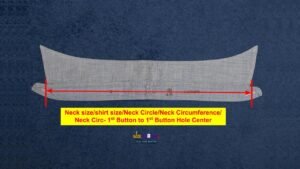


Chest –
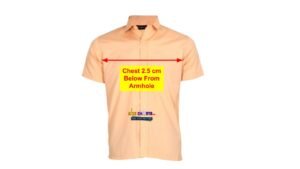
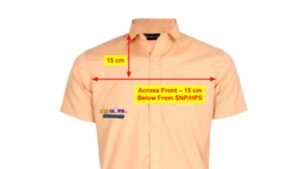
Sleeve –



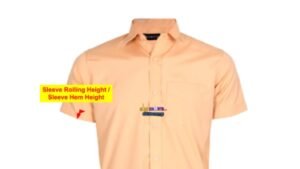
Waist –

Inside Shoulder / Inseam –

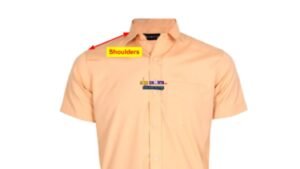
Pocket Position:

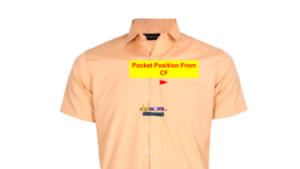
Center back length –


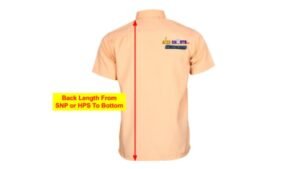
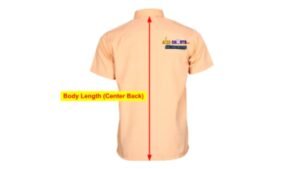
US Shirt Size Women:
Coming to shirts and blouses, it is of utmost importance that the garment must fit the torso and bust. Many shirts designed for women tend to have a curvier shape near the waist to accentuate the curves. For the perfect fit, it is also important that the sleeve length is of proper measurement, especially in relation to shirts and blouses with long sleeves.
Unisex Shirt Size:
We all are aware of the term ‘unisex’, meaning genderless clothing. It refers to an apparel range that can be worn by both men and women. Unisex shirts usually have a straight cut and are quite similar to men’s size charts. They do not accentuate the curves whatsoever like the female shirts. They are loosely fitted with ample room for easy movement.
|
3XL
|
2XL
|
XL
|
L
|
S
|
M
|
XS
|
YL | YM | YS | |
| Weight (lbs) |
n/a
|
n/a |
n/a
|
n/a |
n/a
|
n/a
|
n/a | 62-75 | 54-62 | 49-52 |
|
Waist (inches)
|
44-48
|
40-42
|
36-38
|
33-34
|
30-32
|
32-33
|
28-30
|
n/a | n/a | n/a |
| Height (inches) | n/a | n/a | n/a | n/a | n/a | n/a | n/a | 55-59 | 51-54 | 48-50 |
|
Chest (inches)
|
50-52
|
48-50
|
46-48
|
42-44
|
34-36
|
38-40
|
30-32
|
28 | 27 | 26 |
How do I convert XL/XXL to US Size?
If you would like to convert a shirt size to a US size, which is labeled in Xl/XXL, you can consult the below-given table. For an example, if you have a chest of 48″ with a standard waist of 42″-43″ inches and looking for 37″+ sleeves, then it is advisable you should go for an XXL size. You can use the table for vice-versa situations as well.
Please be informed that this table is for reference purposes and the sizes could vary a bit depending on the manufacturer and brand.
| SIZE(US) | CHEST | SLEEVE | WAIST | NECK |
|---|---|---|---|---|
| XXXL | 54″-56″ | 38″ | 50″-52″ | 19″-19 1/2″ |
| XXL | 47″ – 49″ | 37″ | 41″ – 43″ | 18″ – 18 1/2″ |
| XL | 44″ – 46″ | 36″ | 38″ – 40″ | 17″ – 17 1/2″ |
| L | 41″ – 43″ | 35″ | 35″ – 37″ | 16″ – 16 1/2″ |
| M | 38″ – 40″ | 34″ | 32″ – 34″ | 15″ – 15 1/2″ |
| S | 35″ – 37″ | 33″ | 29″ – 31″ | 14″ – 14 1/2″ |
| XS | 32″ – 34″ | 32″ | 26″ – 28″ | 13″ – 13 1/2″ |
US Shirt Size Comparison Chart–UK<>AUS<>EU<>JAPAN
| US / International. Size |
US/UK Size | AUSTRALIA | Euro Size | JAPAN | French Size | Italian Size |
|---|---|---|---|---|---|---|
| XS | 13.5-14 | 34 | 35-36 | 0 | 37-38 | 38-39 |
| S | 14.5-15 | 36-38 | 37-8 | 1 | 39-40 | 40-41 |
| M | 15.5 | 38-40 | 39-40 | 2 | 41-42 | 42-43 |
| L | 16-16.5 | 40-42 | 41-42 | 3 | 43-44 | 44-45 |
| XL | 17-17.5 | 42-44 | 43-44 | 4 | 45-46 | 46-47 |
| XXL | 18-18.5 | 44-46 | 45-46 | 5 | 48-50 | 49-52 |
| 3XL | 19-19.5 | 46-48 | 47-48 | 6 | 52 | 54 |
| 4XL | 20-20.5 | 50-52 | 49-50 | 7 | 54 | 56 |
Children’s clothing sizes in the US:
Actually, when it comes to children’s clothing size, there is no universal size system. Sizes keep changing from brand to brand. Their clothing sizes are determined by their age, height, and weight, respectively. One has to measure all these before looking for new clothes for his child.
It is very vital to take the child’s height and weight into due consideration because they tend to outgrow their dresses too fast. It is also possible that a child might not fit into a specific size range, his height might be shorter than the mentioned number, or his age might match with a different size altogether. In such cases, the parent should make the final call and order according to his instinct. However, it is advisable to go for a size bigger always.
With so many complexities regarding children’s clothing, it needs a lot of time and patience to find the actual fit. Sizing guides may help, but following the actual measurements will help in shopping for the little ones.
US AND UK conversion SIZES (Men)
US 0 is UK 4 or 6 (Waist 24″/25″ and bust 31″/32′)
US 2 is approximately UK 6 (Waist 24″/25″ and bust 31″/32″)
US 4 is approximately UK 8 (Waist 26″/27″ and Bust 33″/34″)
US 6 is approximately UK 8 or UK 10 ( Waist 27″/28″ and Bust 35″/36″)
US 8 is approximately UK 10 or UK 12 (Waist 29″/30″ and bust 37″/38″)
What size is 42 in the US shirt?
US size 42″ is the standard XXL size which has typical 48″-50″ chest, 37″ Sleeve, 41″-43″ Waist and 18″ – 18 1/2″ neck respectively.
Is the US shirt size the same as the UK?
In short, the US shirt size is the same as the UK shirt size. Men can simply opt-in for the same UK shirt size as the US. If you wear a 44″ US shirt, you can choose the same 44″ US size marking while buying a new shirt for you.